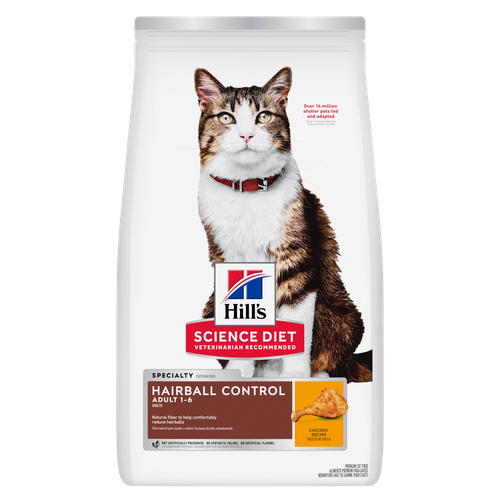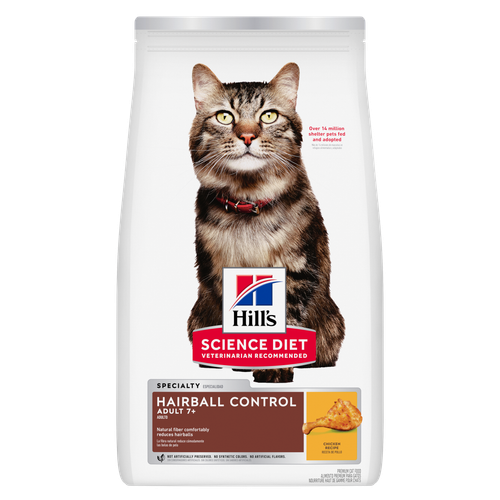
-
Find the right food for your petTake this quiz to see which food may be the best for your furry friend.Find the right food for your petTake this quiz to see which food may be the best for your furry friend.Featured products
 Adult Large Breed Chicken & Barley Recipe Dog Food
Adult Large Breed Chicken & Barley Recipe Dog FoodSupports healthy joints, lean muscle, and beautiful coat for large breed dogs
Shop Now Adult Chicken & Barley Recipe Dog Food
Adult Chicken & Barley Recipe Dog FoodSupports lean muscle and beautiful coat for adult dogs
Shop Now Hill's Science Diet Adult Chicken & Beef Entrée Dog Food
Hill's Science Diet Adult Chicken & Beef Entrée Dog FoodChicken & Beef Entrée in a delicious loaf with complete & balanced nutrition to help keep adult dogs active and healthy
Shop NowFeatured products Adult 7+ Indoor Chicken Recipe Cat Food
Adult 7+ Indoor Chicken Recipe Cat FoodSupports energy level and beautiful fur in mature indoor cats
Shop Now Adult Turkey & Liver Entrée Cat Food
Adult Turkey & Liver Entrée Cat FoodPrecisely balanced nutrition with the delicious taste of minced turkey & liver to help fuel the energy needs of cats during the prime of their life
Shop Now Senior Vitality Adult 7+ Tuna & Vegetables Stew
Senior Vitality Adult 7+ Tuna & Vegetables StewImproves Everyday Ability to Get Up & Go
Shop Now -
Dog
- Dog Tips & Articles
-
Health Category
- Weight
- Food & Environmental Sensitivities
- Urinary
- Digestive
- Joint
- Kidney
-
Life Stage
- Puppy Nutrition
- Adult Nutrition
- Senior Nutrition
Cat- Cat Tips & Articles
-
Health Category
- Weight
- Skin & Food Sensitivities
- Urinary
- Digestive
- Kidney
-
Life Stage
- Kitten Nutrition
- Adult Nutrition
Featured articles The Science Behind Our Love for Pets
The Science Behind Our Love for PetsLearn the scientific reasons why we have such strong connections with our pets, and what science says about the love between humans and our furry friends.
Read More How to Properly Mix Wet & Dry Pet Foods
How to Properly Mix Wet & Dry Pet FoodsAn Orange cat eating from a bowl filled with mixed food
Read More What Is Littermate Syndrome? Pet Adoption Guide
What Is Littermate Syndrome? Pet Adoption GuideLearn more about littermate syndrome in dogs and cats and how to successfully navigate adoption and early socialization processes.
Read More -
Stress in cats
Stress in cats
What causes stress in cats?
While GI or urinary issues are noticeable, cats are likely also experiencing stress hiding in plain sight. There are multiple factors that can cause stress.
- Changes in the home environment
- Inconsistency in routine
- Underlying health condition or pain
Be sure to monitor your cat’s behavior and note any changes to discuss with your vet if you suspect your cat is stressed.


What are the hidden signs of stress?
Even when the signs are visible, it’s easy to overlook a pet’s hidden stress. Urinary signs are the most noticeable of hidden stress signs, so you might be wondering if your cat is stress peeing or if stress can cause urinary problems. If you notice any of these signs, it’s important to make an appointment with your veterinarian.






Managing your pet’s stress
If you suspect your cat is stressed, the first step should be a visit to your veterinarian. They can provide you with guidance and information about how to manage stress in cats. Along with information, they may recommend nutrition or medication to help manage your cat’s stress.


Routine
Providing your cat with consistency can help alleviate some stress. Making sure their litter box is clean and that they have access to plenty of fresh water can help reduce a cat’s stress urination. If you’re looking to calm your stressed cat at home, here are 10 tips to help manage your cat’s stress.


Medication
In addition to behavioral and environmental accommodations, a vet may prescribe medication to help manage your cat’s stress. If you are looking for medications to give your cat, consult with your vet first. Over-the-counter medications should only be used as recommended by your vet.


Nutrition
With the right ingredient blend, your cat’s food can help reduce a cat’s stress. Vets may recommend Hill’s Prescription Diet or Science Diet to help manage signs of stress long-term to improve the quality of life for cats.


Finding the right nutrition to help reduce stress
A veterinarian may recommend therapeutic nutrition as part of a comprehensive plan to help manage a cat’s stress. Hill’s Prescription Diet stress varieties share the same ingredients to make a visible difference in pets experiencing stress.
Proven stress-reducing ingredients
- L-tryptophan acts as a mood balancing ingredient to enhance a stressed cat’s mood
- Milk protein hydrolysate decreases fearfulness & increases contact with people¹
- Omega-3 fatty acids & antioxidants help support the body’s response to stress
¹Beata et al. J Vet Behavior 2007;2:40-46
Ask your vet for a recommendation
Prescription Diet foods offer therapeutic nutrition for a range of health issues — including cats with signs of stress. They’re clinically tested and developed by a team of PhD nutritionists and veterinarians, so you can rest assured your pet is receiving premium nutrition backed by science.
If your cat has signs of stress, schedule an appointment with your vet and ask how Prescription Diet or Science Diet can help.
Ask your vet for a recommendation
Prescription Diet foods offer therapeutic nutrition for a range of health issues — including cats with signs of stress. They’re clinically tested and developed by a team of PhD nutritionists and veterinarians, so you can rest assured your pet is receiving premium nutrition backed by science.
If your cat has signs of stress, schedule an appointment with your vet and ask how Prescription Diet or Science Diet can help.
Related products

Vital nutrients to support 5 essential building blocks for lifelong health

Low calories for less active cats

Natural fiber to help comfortably reduce hairballs

Natural fiber comfortably reduces hairballs

